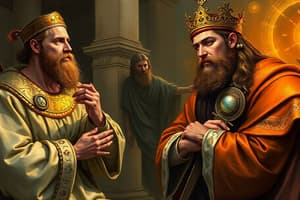Podcast
Questions and Answers
What is the difference between the Italian Renaissance and the Northern Renaissance?
What is the difference between the Italian Renaissance and the Northern Renaissance?
- The Northern Renaissance was more focused on classicism.
- Both were identical in nature.
- The Northern Renaissance was not as secular. (correct)
- The Italian Renaissance was more secular. (correct)
What was the Protestant Reformation?
What was the Protestant Reformation?
A religious movement of the 16th century that aimed to reform the Roman Catholic Church and resulted in the creation of Protestant churches.
Who was Martin Luther?
Who was Martin Luther?
A German monk who criticized the Roman Catholic Church and wrote the 95 theses in 1517.
List one of the causes of the Protestant Reformation: The Catholic church selling __________.
List one of the causes of the Protestant Reformation: The Catholic church selling __________.
How did the Italian Renaissance contribute to the Protestant Reformation?
How did the Italian Renaissance contribute to the Protestant Reformation?
Who invented the printing press?
Who invented the printing press?
What is Christian humanism?
What is Christian humanism?
What are indulgences?
What are indulgences?
How did secular rulers contribute to the Protestant Reformation?
How did secular rulers contribute to the Protestant Reformation?
Who was Charles V?
Who was Charles V?
What was the Edict of Worms?
What was the Edict of Worms?
Study Notes
Italian Renaissance vs. Northern Renaissance
- Italian Renaissance emphasized secularism and drew inspiration from Classical Roman and Greek cultures.
- Northern Renaissance was predominantly religious, particularly in the Holy Roman Empire (HRE).
Protestant Reformation
- A major 16th-century religious movement aimed at reforming the Roman Catholic Church.
- This movement led to the establishment of various Protestant churches.
Martin Luther
- A significant figure in the Reformation, Martin Luther was a German monk and vocal critic of the Catholic Church.
- Authored the 95 theses in 1517, challenging church practices, particularly indulgences.
Causes of Protestant Reformation
- Selling of indulgences by the Catholic Church sparked controversy and dissatisfaction among believers.
- The Catholic Church's hierarchical structure created tensions and calls for reform.
- The influence and power of secular princes in the HRE played a crucial role in promoting reformative ideas.
- Martin Luther’s 95 theses catalyzed public dissent against church practices and corruption.
- Johannes Gutenberg’s invention of the printing press facilitated the rapid dissemination of Reformation ideas, undermining the Church's authority.
- Various acts of defiance against church norms contributed to the growing reformation movement.
Contribution of the Italian Renaissance to Protestant Reformation
- The movement generated new ideas and critical thinking, challenging established authorities.
- The printing press allowed for broader communication and reduced the Catholic Church's control over information.
Johannes Gutenberg
- Inventor of the printing press, which revolutionized the production and distribution of written works.
Christian Humanism
- A blend of humanist philosophy and religious ideals, emphasizing individual agency and moral reasoning within a Christian context.
Indulgences
- A practice where the Catholic Church sold forgiveness for sins, often to raise funds, which led to widespread criticism and calls for reform.
Role of Secular Rulers in Protestant Reformation
- Secular leaders sought change from the Church, promoting reformation ideals to bolster their own power and influence.
Charles V
- Holy Roman Emperor who supported Catholicism and actively opposed the Reformation through the Counter-Reformation efforts.
Edict of Worms
- Legal decree that declared Martin Luther an outlaw in the Holy Roman Empire, ordering the burning of his works and his capture.
Studying That Suits You
Use AI to generate personalized quizzes and flashcards to suit your learning preferences.
Description
Explore the key causes and contrasts between the Italian and Northern Renaissance periods and the Protestant Reformation. This quiz provides insights into how these movements shaped religious and cultural landscapes in the 16th century.




